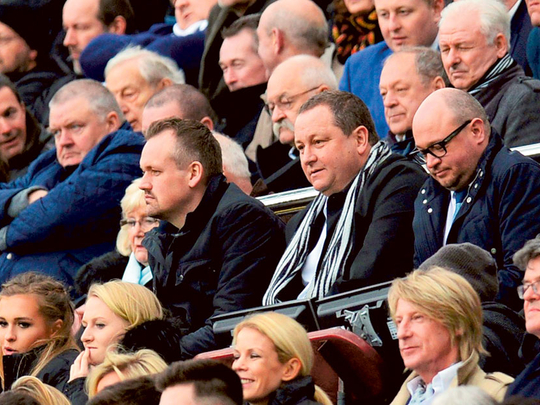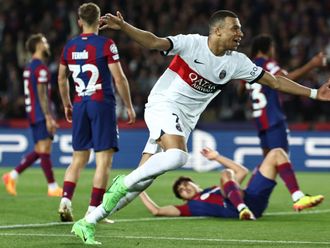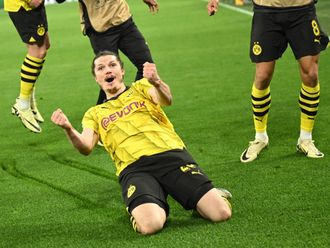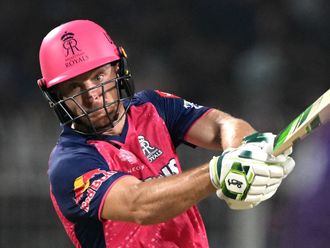
Newcastle: Sunderland meet Newcastle United on Sunday for a Wear-Tyne derby more likely to bathe the Stadium of Light in rancorous bad temper than be a springtime carnival of football passions.
For Sunderland, their new manager, Dick Advocaat, is tasked with maintaining the club above the Premier League relegation places and raising spirits brought to bitter dissatisfaction in the failing end of Gus Poyet’s tenure.
Newcastle, in 12th place, should feel by contrast like a northern rock of stability, clear of real relegation worries, 50,000 crowds still stocking the yawning stands of St James’ Park to watch the fabled black and white shirts of a grand English football club.
The caretaker coach, John Carver, will take a reasonably competent team of mostly frugal signings to Sunderland aiming to win, but among the fans in the stands there is widespread disenchantment with the club’s character under the owner, Mike Ashley, founder of the no-frills retail behemoth Sports Direct.
With a stated football aim of finishing 10th or higher, and cups not a priority, there is a draining of spirit. Michael Martin, a supporters’ trust board member and editor of the True Faith fanzine, sadly describes Newcastle now as “a zombie club, half alive, half dead, going nowhere”.
This week Newcastle announced a £18.7m profit for 2013-14 — lower than expected — a financial performance hailed by the managing director, Lee Charnley, as “positive”, reflecting “the prudent and measured manner in which we operate”.
Yet prudent and measured are not principles to stir the hearts of fans in the one-club city that harbours hopes of greatness. Newcastle still radiates tales of four league championships won early last century, three gleaming FA Cups held aloft in the 1950s, the tradition of hero No. 9s epitomised by “Wor” Jackie Milburn and continued by Alan Shearer until his retirement nine years ago.
Ashley’s recruitment policy now seeks young players not envisaged to serve for years into Geordie legend status but who will instead use the club as a platform for a lucrative move to a bigger status club elsewhere. That the stadium is splattered with adverts for Sports Direct, payday lender Wonga sponsoring the shirts and billboards, frames a cheapskate feel.
“Apathy will kill Newcastle United and the club is drenched in it,” Martin says. “People are concerned about the atmosphere at St James’ Park — it’s appalling. Ashley has got us in this kind of zombie state.”
Following Ashley’s good-time Charlie early period in charge, and the debts he inherited from Newcastle’s first cavalier gallops into the Premier League era, he has settled a pared-down formula on the football club. In the absence of public communication from Ashley, who has given scant interviews over his 25 years piling on the billions since opening his first sports shop in Maidenhead in 1982, the pillars of this Newcastle system have been explained by Charnley and the previous managing director Derek Llambias.
Based on a realist’s assessment of English football’s financial structure, Ashley’s strategy is to remain safely within the Premier League’s golden windfalls, while accepting the club cannot compete with the commercial machines of Manchester United and Arsenal, the wealth of Chelsea and Manchester City, and Tottenham Hotspur and Liverpool, who comprehensively out-earn Newcastle.
That reckoning resulted in Charnley spelling out to a fans’ forum that Newcastle’s minimum target is to finish 10th, which has lodged in many supporters’ minds — unfairly, the club feels — as a satisfaction with being mid-table and profitable.
The firm smack of 21st-century realities was compounded by Charnley saying competing in the cups was not a priority because it requires a depth of first-team squad without which a cup run can threaten Premier League survival. It is thought Alan Pardew strained relations with his employers by fielding strong teams in the Europa League knockout rounds in 2012-13, which they believed contributed to the club finishing 16th in the Premier League after fifth the previous season.
So, fans bred on black-and-white images of glory feel Ashley will not even try to replicate the famous day at Wembley on May 7, 1955, when a grizzled captain, Jimmy Scoular, lifted the FA Cup after a 3-1 victory over Manchester City, Newcastle’s last domestic trophy, ticking round to 60 years ago.
Martin compares Newcastle to some other great sporting names Sports Direct has bought, such as Slazenger, Lonsdale and Everlast, evoking heritage and quality, yet which seem unloved and cheap in the shops, among the racks of gear festooned with discount tags.
“The club feels like something which used to be good,” Martin says, “it has the original label but isn’t genuinely the thing it used to be.”
The club would argue this is unfair, that Sunderland’s present relegation danger shows how much worse things could be, that they have worked hard to run the club on sound policies and plan to make progress.
Yet football is a game of hopes and dreams, heroes and memories, not a mere exercise in financial soundness. Newcastle United, one of England’s grandest clubs, does not feel right as a billboard for a company dedicated to cheapness.
— Guardian News & Media Ltd, 2015










